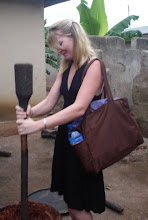So, I realized that in trying to keep you all up to speed with everything I’ve been doing here, I’ve left out some interesting details of life in Ghana. You’ve already heard about Ghanaians’ love of Obama and you know all about trotros, but some of my most interesting interactions have involved everyday observations of people here.
The children are so free and independent—I touched on this briefly, but I’ve really noticed it more and more as time goes on here. It’s such a drastic contrast from the US where children are always watched over by their parents, even being dragged around on leashes in airports and other busy places. In Ghana, the older children (and by older I mean maybe 10 years old) care for the younger children. I see young girls with their baby brother, sister or cousin strapped to their back with a piece of cloth. Children run wild, often with no parents in site, but they always have someone looking out for them. I’m not sure if it’s just that parents are more trusting here, or if in a matriarchal society like the Akan women just look out for each other’s families but I know that it’s pretty touching to be surrounded by such independent, respectful children.
The women here hold hands with each other, reminding me of myself with Megan, Ellie and Eryn in our younger years (and sometimes still today). More uncommonly, though, men hold hand with each other, too. I’ve seen big, brawny police officers holding hands with their huge guns strapped across their bulging chests. Men dance together, too, allowing their bodies to move together with the beat of the drums. This cultural difference caught me off guard at first, but now it feels normal. Why shouldn’t men be affectionate with each other in the same way women friends are? The funny thing about showing affection in public, though, is that you never really see men and women holding hands or being affectionate in public—this is obviously a stark contrast from the US, but rather refreshing in a way, too.
One of the biggest things that I’ve had to adjust to here is the Ghanaian system of bartering. Dealers at craft markets, taxi cab drivers, street vendors: they all try to sell you their services at the obroni price, which is usually triple what the actual cost should be. A typical transaction is as follows:
Me: “How much for a cab ride to Tetteh Quashie?”
Driver: “5 Ghana Cedi.”
Me: “Oh, no, that’s ridiculous. It’s very close! I’ll pay 2 cedi.”
Driver: “Yes, but the traffic is very bad. The price is 4 cedi.”
Me: “No, for that price I’ll just walk.”
*Here, I turn and pretend to walk away from the cab. The driver makes a sort of whistling sound to draw my attention back to the cab and says…
Driver: “Make it 3 and we go.”
While this system has worked well for me, it’s very exhausting and I’m actually looking forward to coming back to the United States where everything has a price tag, no questions about it.
The food in Ghana has also been quite difficult to adjust to. I mean, it’s basically just rice and chicken, rice and fish, fish and chips or chicken and chips but there are some more adventurous dishes. Jolloaf rice is one of my personal favorites. It has little bits of onion cut up and mixed into the rice, which is covered and cooked in some sort of spicy red sauce. The also have red red, which is basically black eyes peas but really spicy and served in a red soup-like substance (hence the name red red). The chicken that is served with nearly every meal is cut in strange ways, the exact part of the chicken unrecognizable. Fish is served whole, with teeth and eyes still intact. The Ghanaians say that if you eat the squishy eyeball, you’ll gain some sort of a special wisdom. I have yet to test this theory. Banku and Fufu are the two most popular dished here. Banku is made with corn as a base, whereas Fufu uses Kasava for a base. The dough for each is mixed up in huge pots and allowed to ferment. Instead of cooking it like you would bread, the dough is served plain. You are supposed to tear pieces off of the doughy ball with your bare hands and dip them in soup or sauce. When they bring you either dish, they also bring you a huge bowl of clean water to wash your hands after each bite. Needless to say, it’s a messy meal. I think it tastes a bit like the sourdough bread dough that Mom used to let rise in the windowsill in the mornings before Christmas. Fried plantains are huge here, but you have to make sure you order them at the right restaurant because some places make them entirely too greasy. Of course, we’re very spoiled with fresh fruit including (but not limited to) mangoes, bananas, coconut, and the best pineapple I’ve ever tasted. Fresh eggs are sold in the streets by our house for just a few cents each—quite a steal if you ask me. Another delicious part about life in Ghana is Coca Cola. Now, if you know me well you know that I don’t really drink soda. But for some reason, the Coke here is so good—it comes in a glass bottle for 35 cents and nothing tastes better after a long day in the heat and dust.
Chickens, goats and small cows run freely through the streets here, almost as prevalent as the children that scurry about, their bellies bare as the run along the dusty paths to their homes. Chickens peck the ground furiously searching for their next meal, and goats stand triumphantly atop giant heaps of garbage like the kings and queens of their landfill. Cows adamantly insist that they should be sacred, as in India, as they sit lazily in open fields.
I could probably write forever about Ghana and all its little quirks, but I’ll save that for a book someday. For now, just know that if you ever do visit Ghana, you’ll never find a better meal than red red, chicken, and a nice, cool Coke from a bottle.
Getting in an 8th Grade Frame of Mind
15 years ago













































No comments:
Post a Comment